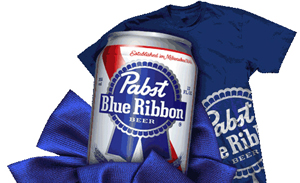Pabst Blue Ribbon sold – finally
From an investor, who planned to milk the brand, to an investor, who will hopefully build the brand. The story of Pabst Blue Ribbon proves that history often comes full circle, alas with variations. When Paul Kalmanovitz, an early consolidator of the U.S. brewing industry, bought Pabst Brewing in 1985, he probably intended to drain Pabst’s equity as he had done with his other beer brands. But he died in 1987 and his fortune went to his charitable trust, the Kalmanovitz trust. Managers of Pabst continued in Mr Kalmanovitz’ style, contracting out production to Miller Brewing and keeping marketing to a minimum. As a result the company’s beer brands saw volumes and market share slip. In 2000, Pabst Brewing sold just over 11 million hl beer, down 15 percent from 1999. Pabst’s market shrank to 5 percent from 30 percent in 1980. In 2009, it had declined even further to 2.7 percent (6.7 million hl) according to Beer Marketers’ Insights.
Probably thanks to the IRS putting down their foot Pabst’s board in 2005 ousted CEO Brian Kovalchuk and replaced him with Kevin Kotecki. But to smarten up Pabst for a sale Mr Kotecki was replaced last year by John Lennon from InBev, who had formerly been CEO of Beck’s North America, as well as Vice-President and General Manager of Guinness Caribbean and Latin America.
Although Pabst Brewing has lost its former glory, the brand Pabst Blue Ribbon has been awarded retro brand cult status among America’s twentysomethings who would rather bring Pabst Blue Ribbon to a party than Bud. Under Mr Lennon’s stewardship, dollar sales of Pabst Blue Ribbon in food, drug and other retail outlets rose 33 percent to about USD 172.7 million (EUR 141 million) in the 52 weeks ending 18 April 2010, it was reported.
With the IRS deadline approaching, media reported that Pabst Brewing had found a buyer in investor Dean Metropoulos, who was willing to spend USD 250 million on the company. Metropoulos – who he? According to media sources, he is an investor in food brands. He is known for buying big brands such as Vlasic Pickles and Bumble Bee Tuna. By all accounts, Mr Metropoulos secured financial backing from the lending arm of General Electric.
The secretive Pabst management had no comment. Neither had Mr Metropoulos.
Mr Metropoulos has long invested in food brands. He assembled the investor group that acquired Aurora Foods – producer of Duncan Hines baking mixes, Lender’s bagels and various syrup brands – out of bankruptcy in March 2004 and combined it with Pinnacle Foods, which counts among its brands Vlasic pickles. In 2007 Pinnacle agreed to be acquired by a group led by the buyout specialist Blackstone Group for about USD 1.3 billion in cash.
Mr Metropoulos does not seem to be a guy clinging on to brands for long. The interesting question is: Who will he sell Pabst to eventually?

